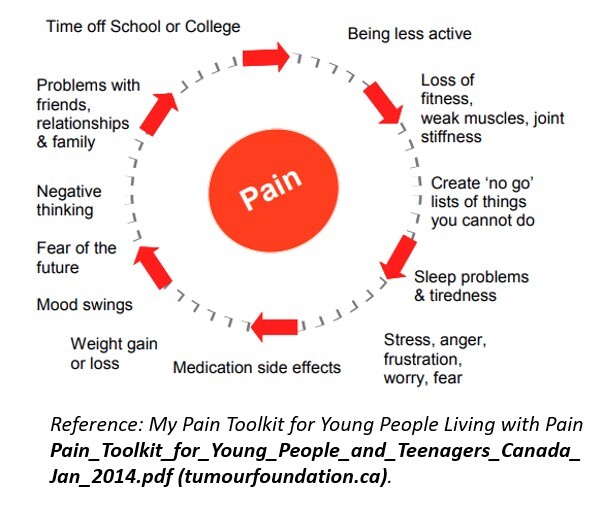Pain Management
Key Points:
- Pain such as headaches and neck pain are very common after a concussion
- Treat pain early instead of waiting for it to become chronic.
- Get help from a professional to manage pain.
- Learn to self-manage pain with strategies other than pain medications (while letting your physician recommend medications as needed).
- Pain can make you depressed but there are ways to improve your mood which will also help with pain management.
Pain
After a concussion, you may have pain from headaches and/or soft tissue injury in the neck, back, or other areas of the body. Treating pain is an important part of concussion recovery.
For headache pain, please see the section on Headaches.
Understanding Pain
Pain is your brain’s way of letting you know that something is wrong. Understanding the way the body is wired can help you to have less pain and do more.
There are 2 types of pain:
is what you feel when you burn yourself or break a bone and you need time for healing and rehabilitation.
is when headaches or soft tissue pain (such as a sore neck or back) persist long after the initial injury. The pain persists even though the injury itself has healed.
When pain sticks around for a long time there are certain changes within the nervous system that can make our alarm system more sensitive. It’s like a sensitive car alarm that goes off when you just walk by the car and not even touch it. Our “pain alarm” system can also get more sensitive and easier to trigger.

The key message is:
- Acute pain is a very useful warning system to prevent bigger harm.
- Chronic pain can become like a faulty car alarm, going off when there really is no harm.
If you suffered pain for longer than 3 months it is defined as chronic.
Who can help?
Your family doctor, pediatrician, physical therapist, occupational therapist and/or other healthcare providers can help you manage acute and chronic pain.
Your health care team can teach you about pacing yourself, gradually increasing activity, not to be afraid of pain, and learn that pain does not always mean you are causing harm to your body. You can learn ways to relax, such as calm breathing or ways to be with the pain without making it worse with negative thoughts (mindfulness and cognitive behavioural therapy).
Learning to manage pain early, can help prevent it from becoming a chronic issue.
How you can manage pain better?
When we are in pain, we feel stressed and this can make the pain feel worse. On the other hand, stress can also make pain worse. You can see it’s a vicious cycle.
How do you break out of this pain cycle? It can seem overwhelming, but with some help it’s very likely that you can break out of this cycle.

- Staying physically active at a level that feels good for you. Exercise is great for stress relief, anxiety, low mood, concentration and memory because of how it affects the brain. Learn more about this in Physical Activities and Sports.
- Having a healthy diet and getting enough sleep so that you feel more energetic. More about this in Sleep Strategies.
- Stretching, yoga and massage can help with muscle tightness.
- Learning relaxation techniques such as diaphragmatic (belly) breathing, progressive muscle relaxation are helpful for managing pain as well as stress and anxiety.
- Managing your stress such as using mindfulness can help calm your nervous system. More about this in Stress Management.
- Using your favourite distracting activities such as watching funny YouTube clips, listening to music, playing a video game.
- Making time for friends and fun will make you feel better. More about this in Social Connections and Meaningful Activities.
- Cognitive behavioral therapy (CBT) is a type of talk therapy that helps you identify and change negative thoughts and behaviours around your pain. A counsellor or psychologist can help you with this and with learning coping strategies for your pain.
The mind and body are closely connected so managing your stress, worries and mood can help with easing the pain in your body.
Add to My Recovery Plan 📒
Here are some common strategies that many teenagers find helpful. You can chose the one that you would like to add to your personalized Recovery Plan.
Check out these resources for more information on pain management: